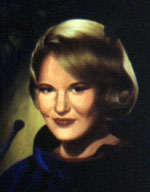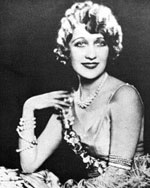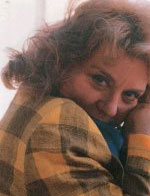Chain Smoking | |
 Peggy Lee | I've been thinking a fair bit about different types of song writing and performance recently. Where to draw the line between the 'safe' territory of images of jazz singing and the biting sting of the black snake blues. How labels such as easy listening give little clue to what really goes on beneath the cover of a Nelson Riddle-arranged Capitol lp. How female singers can turn seemingly traditionalist messages on their heads. Why Bessie Smith, the source of so much sweet sadness, would never have felt constricted by limits of genre, employing jazz and blues instrumentalists with equal effectiveness, and could subvert images of a woman's subservient role in music-making and on a domestic level. Scottish poet Jackie Kay's recent book on Bessie Smith fills in some of the many gaps in her story with empathy and vigour, and movingly coaxes stories of pain and an insatiable appetite for pleasure out of those crackly 78's. It would be hard to find an example amongst jazz vocal records which shakes complacency in the same way as Peggy Lee's Black Coffee, so I'll use that as a starting point. Not simply because the interplay between Miss Lee and Pete Candoli's muted trumpet is breathtaking, but I like to file that one next to Vic Godard's 'Chain Smoking' with its existentialist 'Life is a chain/ I'm in pain' affirmation. Not such a strange association when you consider the importance of crooner style and classic song writing for Vic or post-Josef K Paul Haig (and incidentally, if anyone knows where I can find Haig's Swing in '82 10" Sinatra homage, please let me know). Not just as a means of creating distance between listener and subject matter either, which seems instantly to spring to mind when people mention names like Sinatra, Bobby Darin, or Julie London say. The loungecore revival of recent years has served to bring some of those old names and tunes back into the public arena, but wouldn't it be more exciting if someone did something new with those standards, now rapidly turning into war-horses, exercises in advertising gloss. 'Fly Me to the Moon' as background music for kitchen chores, a faded relic, worn and tarnished like one of Maggie Thatcher's old handbags. |
 Ruth Etting | I personally find some of those records as invigorating and daring as many more revered instances of groundbreaking performance. Gainsbourg had his moments of methodical madness for instance, songs about Chatterton ('Chatterton- suicide/ Schumann-certified') or pink elephants, but find me a line of his to match 'I'm mooning in the morning/ Mourning all the night/ And in between it's nicotine/ And not much heart to fight' or 'I'm hanging out on Monday/ My Sunday dreams to dry'. Tantalizing enough on the page, but given the torchlight frazzled treatment by Peggy Lee on 'Black Coffee', they rapidly become magical moments of keen neon regret. Talk of pink elephants calls to mind Dorothy B. Hughes, whom I discovered recently. Her famed crime novels of the 30's and 40's now languish out of print, but she was responsible for gems such as the original novel of In A Lonely Place and the wonderfully titled Ride the Pink Horse, a seedy parable of obsession and greed on the Mexican border. Proof also that you didn't need to be male to write hardboiled fiction- or, as the work of Ida Lupino shows, to wield a movie camera with the same vigour as the noir boys. Then there's the wry delight of Dorothy L. Sayers' aristocratic detective fiction. I'm sure The Nine Tailors, a tale of campanology and dark secrets in village church life which I read many years ago, helped me to associate gongs and bell sounds with the mysterious stirrings of Pharoah Sanders or Sun Ra. What the Peggy Lee example also illustrates is how much can be achieved with simple means- the Black Coffee lp itself showcases a whole set of similarly themed songs, so that the roots laid down in the eponymous first song inform and feed into the following ones. The version of 'I've Got You Under My Skin' which follows is poles away from the yearning tones of Sinatra's famous version, with its sweet serenade of Harry Edison's trumpet solo underlining the seduction technique. No, there's no sugar in her coffee, thankfully, which makes her take on 'When the World Was Young' all the more potent. No mere nostalgia piece, but three minutes of controlled twilight interior monologue. The anxiety level tightens further with the final track of the original 10' lp, the ultimatum of 'Love Me or Leave Me'. It's a pity she wasn't given a chance of playing the lead-role in the film of the same name, where Doris Day played embattled 20's torch singer Ruth Etting, locked in marriage to hoodlum James Cagney (in the mid-50's anything went, and it usually did). On the cd reissue it's coupled with the more esoteric Sea Shells lp, a strange offering, all exposed vocals amid the balming influence of the harp and harpsichord, the kind of extremely subjective stance which would have alienated many. It's a difficult work to listen to right through, though its polite sheen (Victorian ballads rub shoulders with Chinese poetry) conceals a canny disregard for marketing considerations, the kind of risk Fred Neil took when he invited John Sebastian to play the harp on his debut lp Bleecker and MacDougal. |
 Alberta Hunter | There can't be many finer examples of bizarre hybrid forms than the early work of The Associates, especially Fourth Drawer Down, belatedly being granted cd reissue as I write. While their name gives a clue to the free-for-all, in-for-a-penny approach cultivated by messieurs Rankine and Mackenzie, it also captures a fierce pride in themselves. Thrill-seeking, the thrill of the chase- it reminds me of the hard-won independence staked out by director Robert Aldrich, where each of his films unfurls once the blazing slogan 'AN ASSOCIATES AND ALDRICH PRODUCTION' is introduced. It's a shame the grizzly bear Aldrich's path never crossed Billy's- imagine a noir scenario with 'Gloomy Sunday' from the glorious Sulk lp, restless bodies bathed in those luxurious disembodied vocal gasps. The Billy Mackenzie biography The Glamour Chase recounts how 'Gloomy Sunday', most famously sung by Billie Holiday, remains banned by the BBC- a 30's-era paean to all things morbid, it's invested with a kind of tawdry grandeur by the candid brushstrokes of these vocal stylists. I think it's fitting that a work like Sulk, with all its precious withdrawal from the everyday and the anodyne, is mentioned here- after all, Mackenzie's posturings owed as much to the diva as to facile 70's glam forerunners. And didn't he perform tours in cabaret settings, covering the work of Peggy Lee and others? A recent addition to my canon of jazz and blues heroes is Alberta Hunter, who was part of the cabaret circuit back in the 20's, lending her talents to such unabashed celebrations of the libido as 'Sugar', accompanied on the eerie pipe-organ by Fats Waller. It sounds eerie to me anyway, as David Lynch used Waller's piping on the Eraserhead soundtrack- while I have reservations about his brand of loony tunes confrontation, there's no doubting the Kenneth Anger influence in the frisson his soundtrack counterpoints generate. Hunter could have been remembered simply for those early recordings, but fortunately was coaxed out of retirement in her 80's. Her contribution to the soundtrack of the powerful Remember My Name, a film by Alan Rudolph, of Dorothy Parker biopic and 1920's Lost Generation epic The Moderns fame, is unforgettable. By turn languid meanderings, at others a Lotte Lenya-esque distanced commentary on the proceedings, but mostly a joyous celebration of unrestrained desire, obsession and betrayal replayed through the distorted gauze of memory. Most of the songs figure on the legendary Songs We Taught Your Mother lp, which assembled three women blues singers from the 20's at Rudy Van Gelder's New Jersey studios in 1961. If I were writing about the Rat Pack the affair would be described as a summit meeting, but that would presume the presence of fragile egos scoring points off each other. Here the songs communicate direct energy and joy, even through the veneer of subject matter as scabrous as 'Let Him Beat Me' or the great reworking by Victoria Spivey of her 'Black Snake Blues'. Through association with the film, however, Alberta Hunter's rendition of 'I Got Myself a Workin' Man' ('I don't like those hepster lovers/ They've got larceny in their eyes') and 'You Gotta Reap What You Sow' are all you could wish for from a blues recording. Sharp moral warnings cast in stone, set against the ramshackle brass arrangements, players delivering the goods while playing as if they've stumbled in from an all-day drinking session. |
 Helen Merrill | Dramatizing the state of being under the influence in other ways is the undoubted forte of Helen Merrill. The first jazz vocal recording I remember coming across was her Dream of You lp- her fresh-faced apple-pie looks on the cover seemed to embody all that was wholesome about 50's America. Scratching the surface, though, I noticed song titles like 'Troubled Waters' and 'I'm A Fool to Want You', and the name of Gil Evans as the arranger rang a bell from somewhere. Sure enough, the cover image was about as misleading as you could imagine, for the state of mind explored here is closer to the obsessions exposed with surgical precision by Nick Ray in Bigger Than Life. Songs such as 'Any Place I Hang My Hat Is Home' or 'A New Town is a Blue Town' expose the fallacy of domestic security. All of Merrill's recordings need to be listened to at louder volume than most- her subtle delivery is much softer than that of her forbears, rendering comparison with Billie or Ella superfluous. Yet all through these songs the command and composure she exudes threaten to burst their banks. The recording of Evans favourite 'Where Flamingos Fly' is a prime example, with tension crackling through the piano and flute accompaniment. Evans also creates an otherwordly intro for 'This is my Night to Cry', with a whiplash flute and harp combination preparing a soft bed for the tale of nostalgia for escape to unfold upon. The sauntering mixture of abandon and stagnant self-analysis present in the words is mirrored in the sinewy instrumentation, and through all this the singer's muted delivery asserts its power above the aching perfection of the textures exploited by Evans's charts. The record still leaves me to wonder at the complexity and transparent precision of the affair. Thirty odd years later singer and arranger returned to the studio to collaborate again- and chose to record the album again, trusting to the passage of time to yield new insights, revisiting the familiar from a new perspective. Elsewhere her recording of 'Blue Guitar' throws up associations with Wallace Stevens, Picasso and, latterly, The Red House Painters- but I'll leave that particular trail to French critics to work through. Suffice it to say that Merrill gives the lie to the mellow yellow notion that quiet means lethargic or unfocused. Concealed behind the microphone, Merrill's attitude recalls that of Dorothy Parker, equally fearless and prepared to carve out an escape route by any means other than mediocrity: 'People ought to be one of two things, young or old. No, what's the good of fooling? People ought to be one of two things, young or dead.' © 2000 Marino Guida |